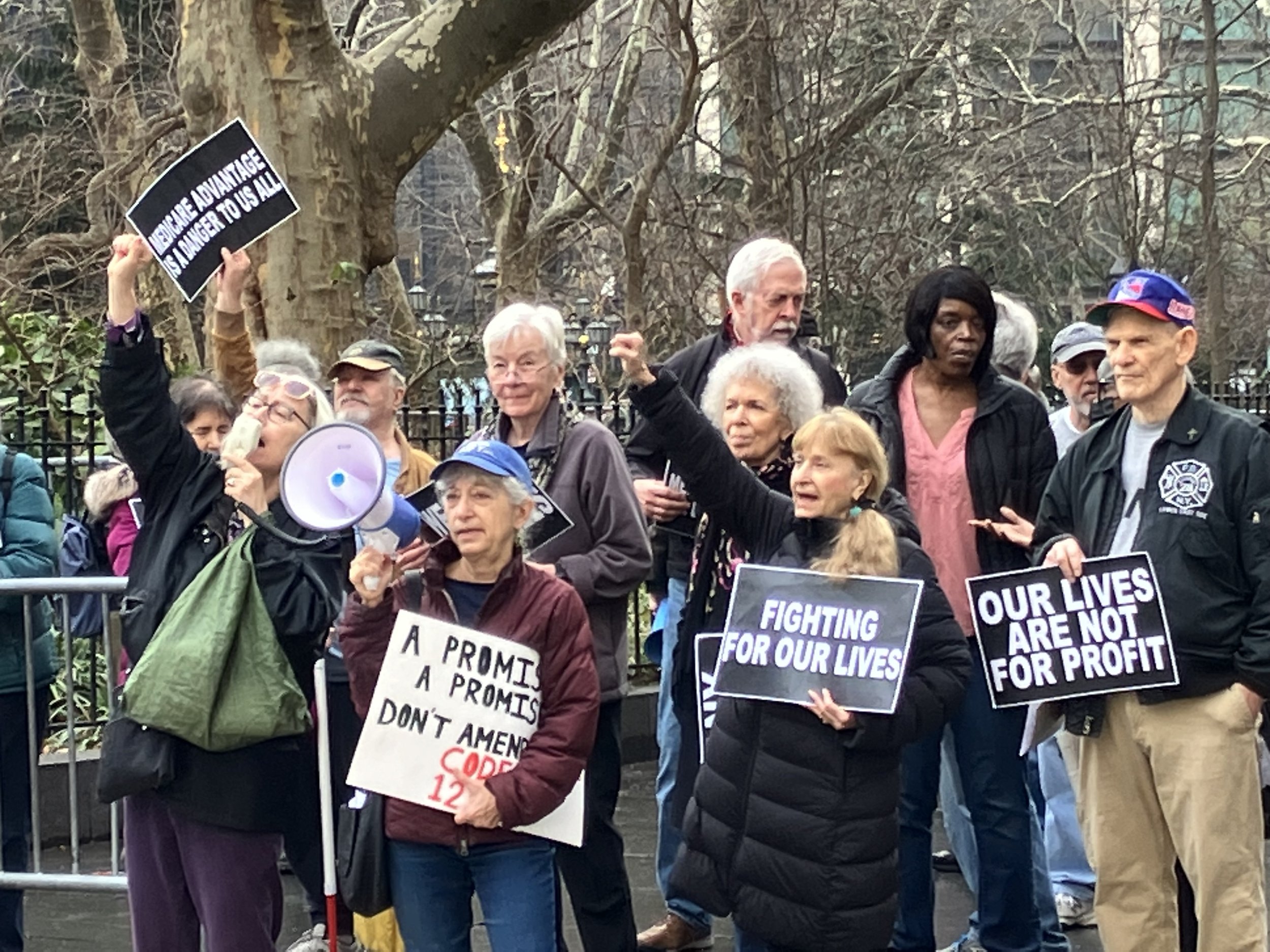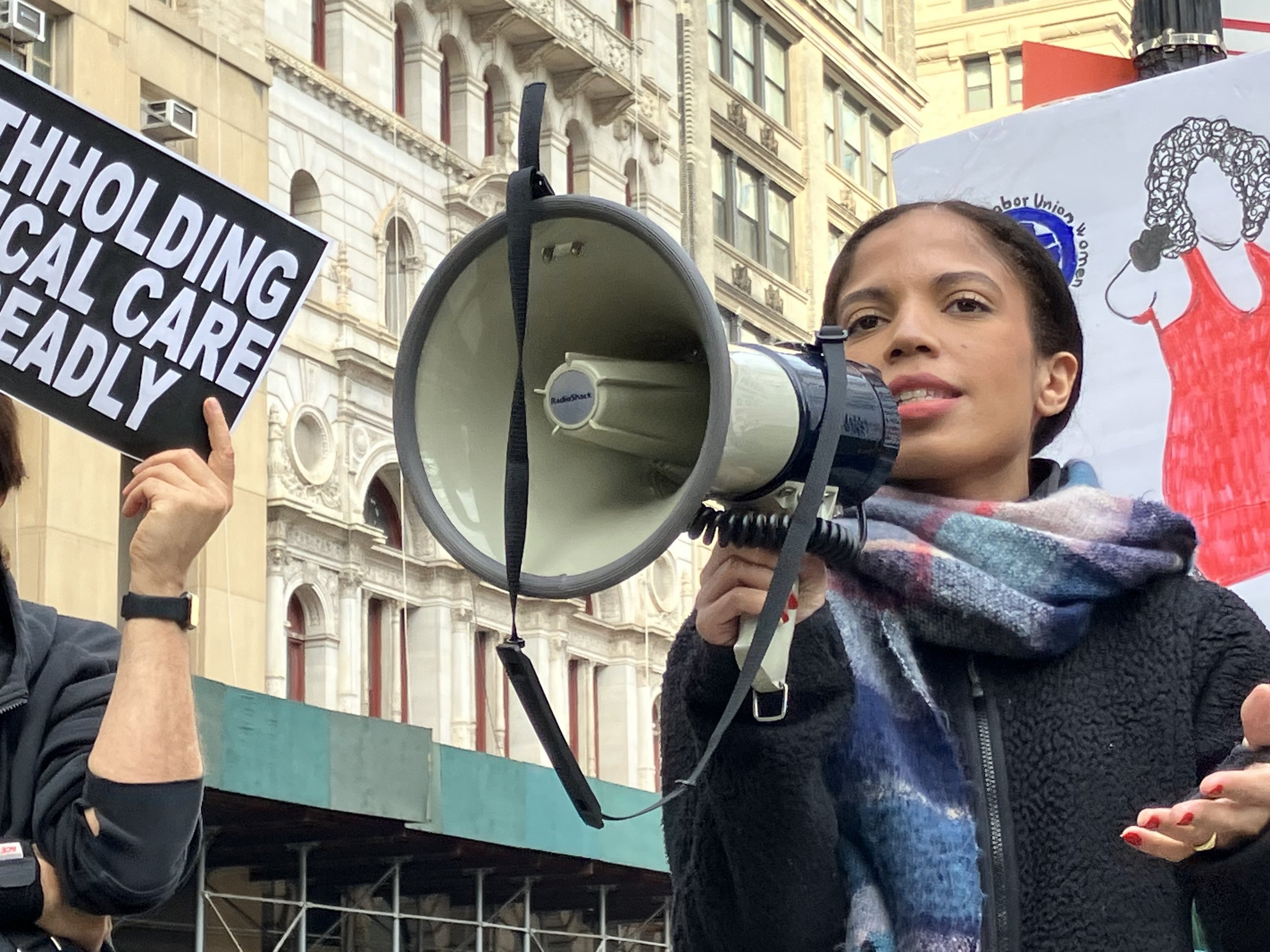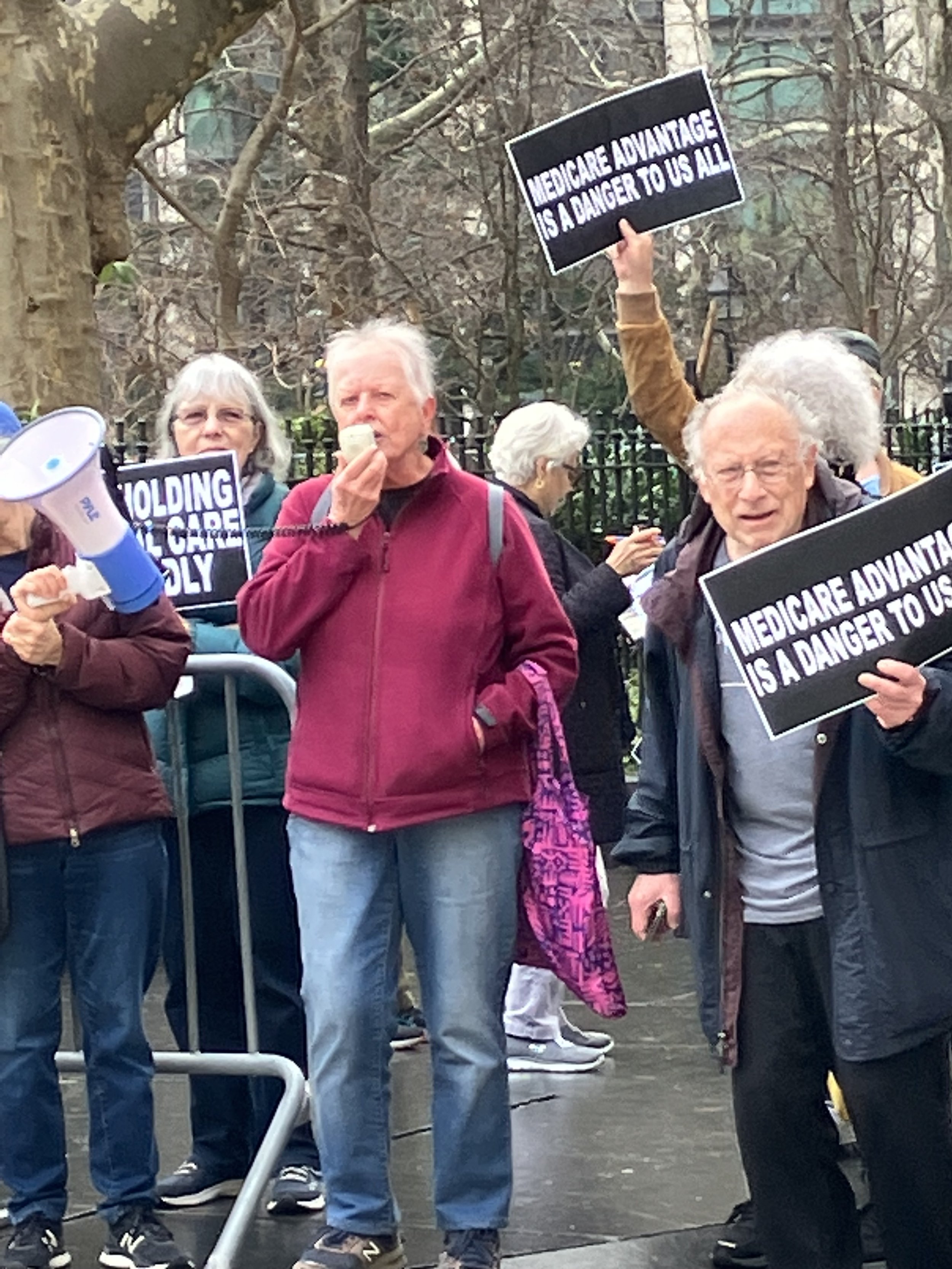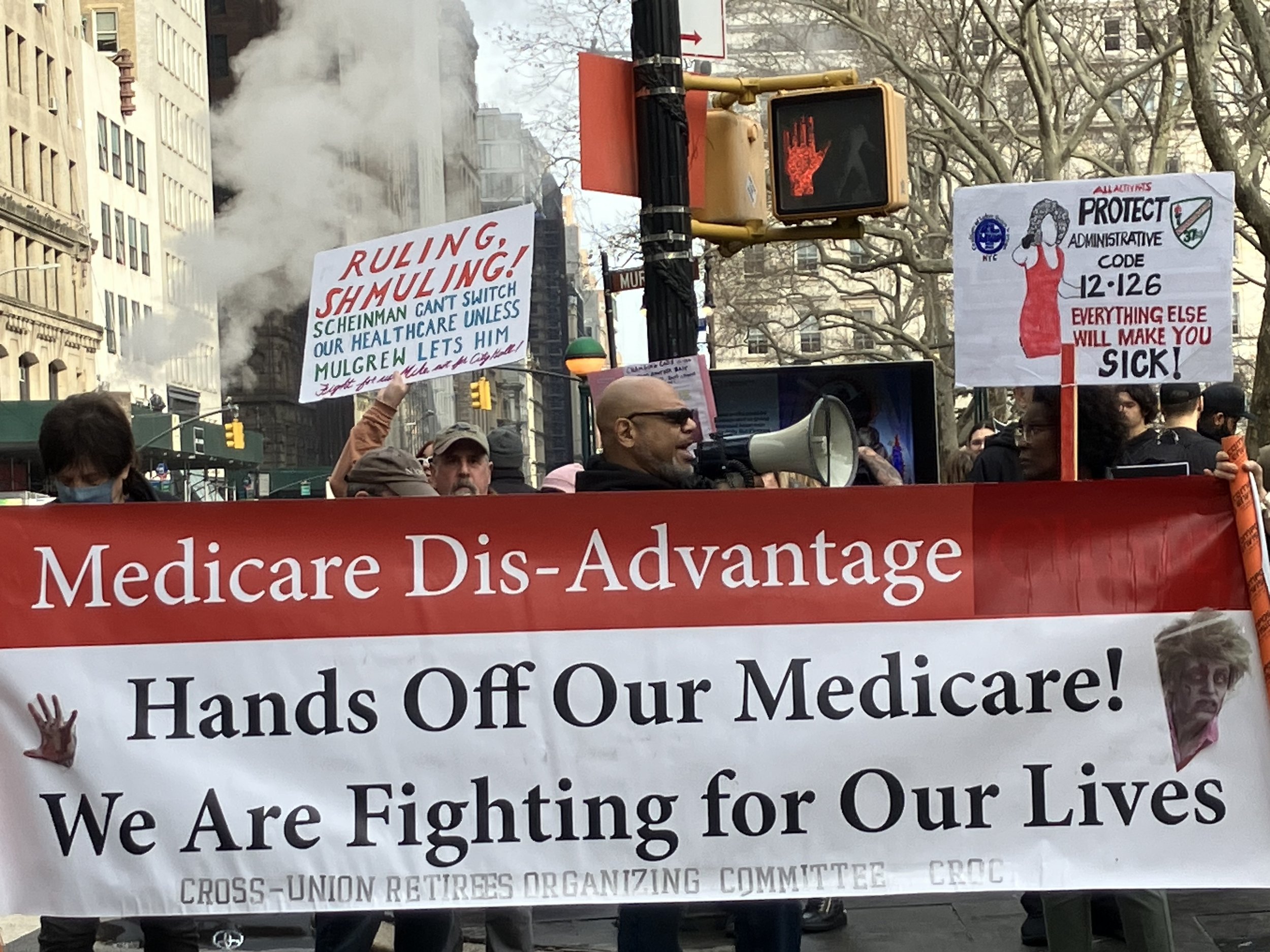New York City Municipal Retirees Standing Tall In An ‘Upside-Down World’
Municipal retirees rally outside the gates of City Hall on Jan. 4. Photos by Joe Maniscalco.
By Joe Maniscalco
New York City Retirees opposing ongoing efforts to push them into a disastrous privatized health insurance plan aren’t buying Speaker Adrienne Adams’ sudden rationale for attempting to alter the law that’s protected municipal healthcare for decades.
Roughly 75 to 100 municipal retirees and their supporters rallied outside the gates of City Hall on Wednesday, Jan. 4 ahead of a surprise City Council meeting where a bill aimed at changing Administrative Code 12-126 and municipal worker healthcare was being introduced.
“It doesn’t make sense to us — the language they have used is the same language that the city put out months ago,” retired UFT educator and Cross-Union Retirees Organizing Committee [CROC] member Sarah Shapiro told Work-Bites. “Basically, what it will allow them to do is have different benchmarks for different classes of individuals. We will not have any protections if we amend this, and we’re appalled that the City Council doesn’t understand this — especially Carmen De La Rosa who should know better.”
Council Member Carmen De La Rosa [D-10th District], chair of the Civll Service and Labor Committee, had previously been a strong supporter of universal healthcare and the NY Health Act.
Speaker Adams and De La Rosa, however, released a joint statement on Jan. 3, saying that no matter how the City Council acts on amending Administrative Code 12-126, Mayor Eric Adams and the Municipal Labor Committee will be “moving forward to implement Medicare Advantage.”
CUNY student and “future teacher” Kaitlin R. warns that forcing retirees into privatized Medicare Advantage health insurance hurts all municipal workers.
“It’s very disturbing that they released that statement because it suggests that they have already made up their minds,” CROC member Martha Cameron told Work-Bites. “My feeling about this is there have been snow jobs going on all along the way.”
Retirees and their supporters rallying outside the City Hall gates later found themselves barred from actually attending the City Council meeting where the bill aimed at amending Administrative Code 12-126 was introduced.
“This will affect a quarter million retirees who exist right now — but it will also affect every single active worker who is a union member in this city,” Cameron told protesters.
“It will take away our equality. It will set up division between workers — uniforms versus clericals; old people versus young; new hires versus people with seniority.”
Kaitlan R., a 23-year-old CUNY student from the Bronx studying to become a bilingual education teacher, told Work-Bites she had to attend the rally and speak out because what was happening inside City Hall was also surely going to affect “future teachers” like her.
“The media wants to pretend this is only gonna affect retirees — it’s not gonna only affect retirees,” she said. “It’s gonna affect all public sector workers. But even if it did only affect retirees — that does’t make it any better. People who worked their entire lives…to get to this point and all of a sudden they’re suppose to be without anything?”
Martha Cameron, 80, denounces plans to push retirees into Medicare Advantage health insurance, while also outlining alternatives.
In their Jan. 3 statement about changing the Administrative Code, Speaker Adams and Civil Service and Labor Committee Chair De La Rosa mentioned “support for low-income retirees to truly access choice in their healthcare coverage.”
“How are they going to do that if they say you must take Medicare Advantage or pay premiums of $200 a month?” Cameron added. “Is there gonna be some kind of means test for low-income workers? That was unclear to me — it was baffling in fact.”
Roberta Gonzalez, who spent nearly 40 years of her life working for the City of New York, directed most of her anger at a mayor who denounced Medicare Advantage as a “bait and switch” on the campaign trail — only to flip-flop once he got into office.
“I don’t understand how they think it can benefit us,” the 70-year-old, who is also battling cancer said. “They don’t care — that’s the bottom line. They’re shoving us aside.”
IBT Local 831 retiree John Pinard referenced Mayor Eric Adams’ recent rodent issues, calling him the “dis-honorable pied piper of New York City” and blaming him for wasting tax-payer money that could be used to cover the cost of municipal healthcare.
IBT Local 831 retiree John Pinard leads protesters in a chant against Medicare Advantage.
He also took his old union president — Municipal Labor Committee Chair Harry Nespoli — to task for pushing Medicare Advantage.
“Harry was a great fighter my whole 20 years” Pinard said, “and now, I guess he’s got such a good deal he’s turned his back on us. He’s been a wonderful fighter — the most courageous fighter I’ve ever seen in my life, and I can’t understand — I can’t put together in my head how this came about. I’m not supposed to be out here fighting for something I already earned. This is unbelievable.”
New York City has become a completely “upside-down world” for municipal retirees fighting to hold onto their traditional Medicare coverge. Some very influential labor leaders and progressive Democrats are their biggest problems — while City Council Republicans are their strongest allies.
“I don’t understand,” Shapiro added, “Carmen De La Rosa ran as a proponent of the New York Health Act. How does somebody reverse her principles and stance so dramatically? Right now, we have the support of all of the Common Sense Caucus, all of the Republicans are standing with us. Where are the progressives? Where are the Democrats?”
Municipal retirees fighting Medicare Advantage insist arbitrator Martin Scheinman’s December 15, finding in favor of privatization amounts to no more than “paid propaganda” in service of pro-Medicare Advantage forces.
“This can’t go forward,” Shapiro added. [The City Council] keeps thinking that the arbitrator has made a ruling — that is completely and utterly false. They keep thinking if they don’t amend [the Administrative Code] then we’re all gonna be thrown into Medicare Advantage. It’s crazy. We are working very hard on the City Council to make sure they understand that if they amend this code we are getting a diminishment of our healthcare.”
Retirees have put forth an alternative plan that includes utilizing a half-billion-dollars over the next two years from the city’s Retiree Health Benefits Trust to shore up the ailing Health Insurance Stabilization Fund.
“Within CROC there are people who are almost 90 and they are working day and night on this stuff — and they’re brilliant,” added Cameron, who is also battling cancer.
What worries her, however, are other New York City retirees who might erroneously think that after two court victories the fight against Medicare Advantage is over.
“Think about the thousands and thousands of people who have no idea this is gonna happen to them — and it will happen overnight. They will lose everything,” Cameron said.
On Jan. 5, Marianne Pizzitola, president of the NYC Organization of Public Service Retirees issued a statement unequivocally condemning the “heinous attempt to strip healthcare benefits from New York’s retirees.”
“This proposal will come at the expense of the men and women who kept New York City running for decades,” she said. “Mayor Adams is attempting to save money on the backs of hundreds of thousands of seniors and disabled individuals who worked their entire lives to support themselves, their families, and New York City. These retirees should not be forced to sacrifice their lives, their healthcare, so that the City can save money.”
Pizzitola also re-emphasized retirees’ plan to help the city realize more than $300 million in savings — as well as the administration’s refusal to listen.
“The Adams administration has repeatedly canceled meetings and refused to acknowledge our plan,” Pizzitola Said. “If Mayor Adams was willing, we could save the city money without burdening those we should be uplifting.”
While applauding members of the City Council who have joined with retirees against efforts to amend the Administrative Code, Pizzitola said, “The majority of the conference needs to stand with us also and be the voices that they were elected for the people. We need the City Council to be our champion and protect us from being the poster child for fixing the budget crisis.”
This story has been updated to include the statement from NYC Organization of Public Service Retirees President Marianne Pizzitola.




